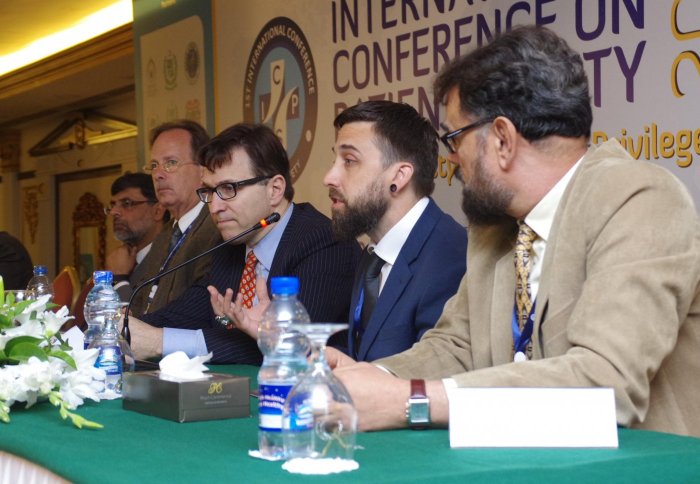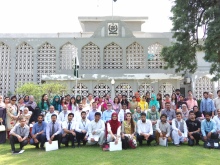From the first Annual International Conference on Patient Safety in Pakistan

Joshua Symons speaking at the first Annual International Patient Safety Conference in Pakistan.
Joshua Symons of the Centre for Health Policy writes on his visit to the first Annual International Conference on Patient Safety in Pakistan.
Last weekend I had the pleasure of presenting on behalf of the World Innovation Summit for Health (WISH) at the 1st Annual International Conference on Patient Safety in Islamabad, Pakistan. This ambitious event was organized by Dr. Zakiuddin Ahmed in partnership with Riphah International University, with WISH as a primary sponsor. It was the first of its kind, hosting great minds both domestic and global, who pledged themselves to the Islamabad Declaration on Patient Safety. This declaration, among several other calls to national action, included a call to the government to increase GDP spending to at least 3% for health.
My own presentation was primarily on CareReport, a new application for patient safety reporting and learning, which had first been displayed at the WISH 2015 world innovation showcase. The application in its current form is the output of a 3-year research and development programme on the NRLS1 UK as part of the Imperial College NIHR PSTRC, which was graciously funded by NHS England. The application also demonstrated learning gained from the Leading Health Systems Network (LHSN), which is a collaboration between WISH and the Institute for Global Health Innovation at Imperial College London.

There was a rich variety of presenters from private institutions, military, and university, including representation from notable private hospitals such as Aga Khan University Hospital and Indus Hospital. Much of the focus from presenters and enthusiastic participation from the audience was in regard to the importance of patient safety culture within hospitals. Overall, their approaches were unique and their genuine commitment to the cause of patient safety was clearly evident.
As I sat there though, taking in the presentations, I couldn’t help but consider the state of Pakistan’s public health sector, a sector which seemed unrepresented. This could hardly come as a surprise though. The rolling blackouts which affected the hotel in Rawalpindi were a stark reminder of the challenges currently facing the public sector clinicians who have the uphill battle of committing to patient safety and service quality on a budget of less than 1% GDP2 (compared to 7.6% GDP for the UK), while also having to worry about basic things such as sources of electricity and clean water.
After my presentation of CareReport it was kindly pointed out to me that an application could not fix these problems. It was no replacement for people on the ground and stable resources, or investment in infrastructure. I told this person that I agreed completely. Having worked in offshoring for years I was well aware that any initiative to try and replace people with processes is usually doomed to fail. This was covered both by the WISH report Transforming Patient Safety: A Sector-Wide Systems Approach, and the seemingly general view of most of those present that improving patient safety culture is only a part of providing safer care (albeit a part that’s easy to be enthusiastic about). There are many parts which have to be addressed as a whole.
I am looking forward to the next ICPS with anticipation. It is my hope, given the great declaration that those in attendance pledged themselves to, that this commitment is carried out beyond just defining a process of patient safety. I would hope that the government is able to take the call given, knowing well that an investment in the health of the public is an investment in the future of the country. I also hope that the notable private hospitals take the mission of patient safety beyond their own doors by building strong lasting relationships within the public sector, which could benefit from their experience in quality and safety.
About the author: Joshua Symons currently runs the Big Data and Analytical Unit within the Centre for Health Policy at Imperial College London. Joshua is a developer by trade and worked in finance for many years while also providing voluntary consultancy to the Centre for Health Policy for 4 years as an Honorary Research Fellow before joining full time in May of 2015.
1 http://www.nrls.npsa.nhs.uk/ (Note: the NPSA was disbanded in 2012)
Article text (excluding photos or graphics) © Imperial College London.
Photos and graphics subject to third party copyright used with permission or © Imperial College London.
Reporter
MR JOSHUA SYMONS
Institute of Global Health Innovation